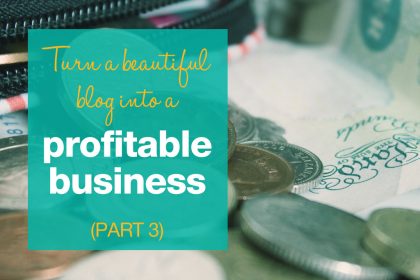Seven mistakes to avoid when starting a blog
Thinking of starting a blog? In order to increase your chances of success, here are seven mistakes you need to avoid.
It can seem a brilliant – and achievable – idea to start a blog. After all, you enjoy writing, you have a topic you feel passionately about or expertise you feel compelled to share. How complicated can it be to channel that passion and expertise into a blog?
Actually, it can be MUCH more complicated than that!
While yes, it’s true that anyone can start a blog. If you want your blog to be read, shared, engaged with and respected, you need to do much, much more than just start writing.
To help you get an idea of some of the key things you need to take into account when launching a blog, here are seven important mistakes you want to avoid.
1) You set up an unrealistic blog posting strategy
It’s easy to get caught up in enthusiasm when you first start a blog. And commit to an ambitious, but unsustainable posting strategy.
Yes, you may feel inspired to churn out six blogs in a row on day one. And easily produce 1,500 word masterpieces on demand. But do you genuinely have the time, and can you sustain the enthusiasm day in and day out to maintain that level of labour?
The chances are, you don’t.
Instead, it’s much better to be more realistic from the outset. This way you’re more likely to keep to your schedule, and not burning out within month one.
So, when launching, consider how much available time you have to devote to writing blogs on a regular basis, and how many blogs you can realistically write in that time. Take into account, too, the time you’ll need to proof read, find images, and share and promote your blog in emails and on social media.
Read more tips on writing and sharing your blog here:
- The beginner’s guide to growing your blog traffic
- Why you don’t need to be interesting to write a great blog
- How to write a blog people will want to read
- Learn the secret of writing powerful headlines
2) You don’t allocate enough financial resources
There are bloggers who started out as an all-in-one team of… one. They have handled the themes, logo design, content writing, web hosting, and everything else that’s involved in running a blog.
However, you can only be a successful blogger if these are skills you already have, or are confident you can quickly master. Being able to write a brilliant blog is just one tiny piece of what makes a blog successful, so if you don’t have all the skills you need, set aside the budget to outsource them.
And while you may be able to find some free resources to support your blog, be wary of relying too heavily on sub-standard services as a result. For example, it pays to bear in mind:
- A free hosting provider might be less reliable than a paid one.
- Your logo won’t be unique if you use a free font from a platform that anyone can later use.
- If you are a good writer, but not patient enough to proofread your own work, find a collaborator instead of publishing unverified content.
3) You don’t take GDPR compliance seriously enough
Forbes predicted in 2017 that GDPR would affect US-based online businesses, due to the free access of the internet. Financial Times also claimed that the resolution itself is not sufficient to independently protect online privacy.
Why GDPR matter if your blog isn’t based in the EU? Because, while it may only mandatory for European countries, your blog is available everywhere. This means you need to compile the necessary documents, including a GDPR-compliant privacy policy, and terms of use with the rights and responsibilities of the reader and yourself. Here are some quick GDPR tips:
- Learn the guidelines from official sources.
- Don’t overdo it. You don’t need to write 30+ pages of official rules. Find out what are the mandatory requirements and ensure they’re in your terms and conditions.
- Don’t just copy and paste from other blogs. While all the policies are pretty similar, your website will have its own particularities. Make sure that your mandatory pages have all the legal requirements.
4) You don’t invest in a brand
Successful blogs don’t just have brilliant, unique writing – they have a strong, unique brand. So what’s your niche? Who is your blog written for? Why should they care about you? What makes your blog unique, special, a must-read? What’s your USP?
These are all questions you need to answer when coming up with a brand for your blog. They need to be taken into consideration when coming up with a theme, a name, and planning your visual identity and logo.
You also need to consider what your actual blog looks, like, and create templates for the pages so they have a consistent, recognisable look. The same goes for any imagery you use. Whether you go with illustrations, third party photography or your own images, the style needs to be recognisably ‘you’ and consistent.
5) Your design is difficult to read
It’s tempting to get carried away when planning and designing your blog. To cram every page with different fonts and colours, and intricate designs and images.
But when it comes to design, less is more. Especially if you want people to actually be able to read what you write.
There’s a very good reason why successful bloggers opt for a bright design with black writing, instead of dark backgrounds and light text.
It’s much easier to read and maintain focus on the important parts when a design has plenty of white space. It’s also easier to read when the copy has space to breathe; when our attention isn’t being distracted by other text and images crammed next to the writing.
Here are some quick tips to help you get the design of your blog right:
- Stick with your design choice from the beginning without considering any potentially useful add-ons.
- Consider the primary categories for your blog and why you will need them in the long run. These can be about me, write on the blog, contact me, work with me, your main focus areas, and other categories that your posts will fit in.
- Look for solutions for things like awards or badges that you want to outline on your blog in designated categories.
6) You offer poor customer support
As you’re probably increasingly aware now, your blog is going to take a lot more work than simply writing and publishing blogs.
As well as managing the back end and posting and engaging on social media, you’ll need to establish a system that involves quickly answering emails and comments so that your readers can see you have a high level of engagement, and will come back to check your work and even recommend you to their friends.
If you choose to approve comments before they are published, you’ll also need to come up with a system to address the notification for each comment as they are posted.
Responding to comments and emails engages your readers and keeps them interested in the topics you post about.Plus, they can be instrumental if they come from experts in specific fields, as they will validate your stance on the subject. Never ignore someone who has taken the time to comment on your website.
Here are some more tips:
- Encourage more comments by setting up a conversation from that particular first comment.
- Always be respectful with your audience.
- Build your credibility by providing complete answers to questions.
- Improve your visibility by answering each comment independently (this will increase) the number of comments.
7) You don’t use research and data properly
It can seem natural, and even easy, to write passionately about something you love and know well. But in order for your blog to be successful, you need to be thorough and accurate. You need to be an authority on your subject.
And in order to be an authority, you need to demonstrate that your blog is well researched, and uses accurate, up to date data. Even if your blogs are based on personal thoughts and experience, you’ll need to back these up with credible examples and third party information.
You also need to ensure that your blogs’ subject matter and angles are what readers are actually looking for, and will want to read, share and recommend.
Here are some quick tips to help you use data effectively:
- Back up any research or theory with facts that can be verified. If the subject of the matter is within your area of knowledge you can formulate conclusions or theorems based on existing data.
- Ensure that you link to credible sources. For example, if you link to another blog with a statistic, trace their source to ensure it’s accurate.
- Use online tools to find out what users are searching for, and answer their queries through well-researched articles.
Read more blogging advice
Ready to launch a successful blog? You’ll find more tips in these articles:
- Four steps to making your business blog successful
- Want to turn blogging into a career? Here’s five ways to do it
- How to take brilliant lifestyle photos for your website or blog
- Six ingredients for launching a successful blog
Sean Blaney is the co-founder of CalendarTable.com. Among other things, Sean’s blog provides access to highly personalised calendar printout formats, so you can add photos, quotes or other inspiring material at your disposal.
Photo by rawpixel










